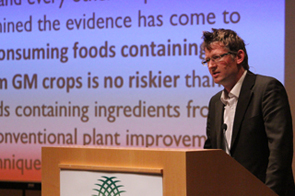
An outspoken activist and environmentalist, Lynas wrote his last anti-GM article in 2008. He now characterizes his former anti-GM activities as “no better than a campaign against vaccination and immunization,” and even "against basic humanitarian values.”
He described this transformation during the Danforth Plant Science Center’s Seeds of Change event Thursday morning, where he said he credits science for changing his opinion.
In an interview with Agri-Pulse, Lynas said the process was a “long and painful” one.
“Not many change their mind on evidence that contradicts their worldview,” he said.
He noted he gains skeptics from all sides for switching positions in a high-profile debate, adding that “people lose credibility when they change their mind.”
“I was defending what I saw as objectivity of science on climate change, which put me in a position to recognize I was attacking science myself on GE [genetic engineering],” he explained. “I resolved those things by ultimately changing my mind.”
He often gives the example of opposition to Golden Rice, or rice genetically modified to contain high levels of beta carotene that had a breakthrough in the late 1990s. He said the high levels of beta carotene were intended to compensate for vitamin A deficiency in children, common in developing countries around the globe. Greenpeace opposed the technology and accused U.S. researchers of using Chinese children as “guinea pigs” in their studies, generating far-reaching public skepticism of Golden Rice.
“They were stopping a lifesaving technology solely to flatter their own fanaticism,” Lynas asserted in a former speech at Cornell University.
More recently, Lynas penned an opinion piece on a study released this week by a team of Australian scientists and U.S. researchers on feeding GM food to pigs. The study claimed that GM-fed pigs had significantly higher rates of stomach inflammation that non-GM fed pigs. Critics conclude that the pigs began the study in poor health and both groups of pigs showed various ranges of inflammation.
Calling it “very bogus non-science,” Lynas said the study generated headlines nonetheless. According to Lynas, the study subjected the pigs “to inhumanely poor conditions resulting in health impacts which can then be data-mined to present ‘evidence’ against GMO [genetically modified organism] feeds.”
In the interview with Agri-Pulse, Lynas noted that an “anti-corporate” argument, which ranks high in current popular culture, is often used to oppose genetically modified food. “This idea that there’s something inherent in GMO technology that only benefits corporations like Monsanto, in particular, is kind of ridiculous,” he said, given that similar research is pursued in the public sector as well.
In describing the wholesale opposition to GM crop technology in which he participated, Lynas said the movement was “about an emotional commitment even deeper than the political commitments.”
“This is ideology in its purest form,” he said. He and others opposed technology in agriculture, choosing “a romantic view of the past and, therefore, a romantic view of the future.”
Lynas said it took him three years to write about his changing worldview in his book The God Species. Although he said he was cautious with his language at the time, he no longer uses restraint. “I knew what I’d done in the anti-GMO movement had probably done real damage in the world—to the environment and food security, and the reputation of the institute of science,” he maintained in his speech at the Danforth Center.
“We’re facing a situation where population and economic growth means we have to double food production,” he said regarding the estimated world population size of nine billion people by 2050. “We are going to have to support this population.”
Recognizing the European Union’s restrictions on genetically modified foods and the use of GM crops in agriculture, Lynas blamed EU regulatory authorities for obeying demands of anti-GM activists.
However, he believes the debate is “close to the tipping point,” and that “those who are ideologically anti-GMO are becoming increasingly marginalized.”
“All of the main environmental groups in the UK have completely deprioritized the anti-GMO campaigns,” he claimed. “This debate is going on in the environmental movement.”
During his speech at the Danforth Center, Lynas featured a video made last year by Rothamsted researchers studying GM wheat. Although the pitch was “not glossy, not PR, not polished,” the researchers sent a message in response to their opponents that he believed “won the media battle on the issue.”
He compared the goals of scientists in the GM crop field to those in the climate change field and suggested they achieve the same public opinion rate by becoming activists themselves.
“Scientists have to be activists in this field, just as they were with climate change,” he told Agri-Pulse. “If scientists don’t frame the debate, then the antis will frame the debate.”
GMO labeling in the United States
Grocery chain Whole Foods recently committed to adopting a GMO labeling policy in its stores in an effort to appeal to its shopper demographic. “They recognized a great market opportunity,” said Lynas. “It’s a good capitalist reason for them.”
However, an increasing number of states are voting on laws to mandate that foods made with genetically modified ingredients be labeled as such.
“I’m very torn about this,” Lynas said.
“It’s obviously a losing proposition to say, ‘You don’t have the right to know what’s in your food,’” he said. “On the other hand, stamping a ‘skull and crossbones’ on half of the nation’s food supply is not going to be a winning proposition either.”
He suggested that GMO producers and users “shouldn’t be scared of labeling.”
Instead, he hoped for some kind of happy medium, “Where we say, ‘Absolutely we will label, because we think what’s gone into this food is an improvement.’”
#30
For more news, go to www.agri-pulse.com
